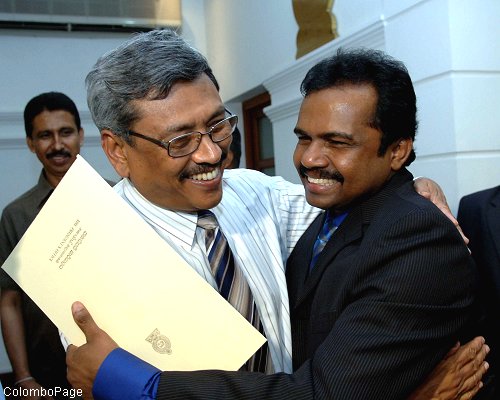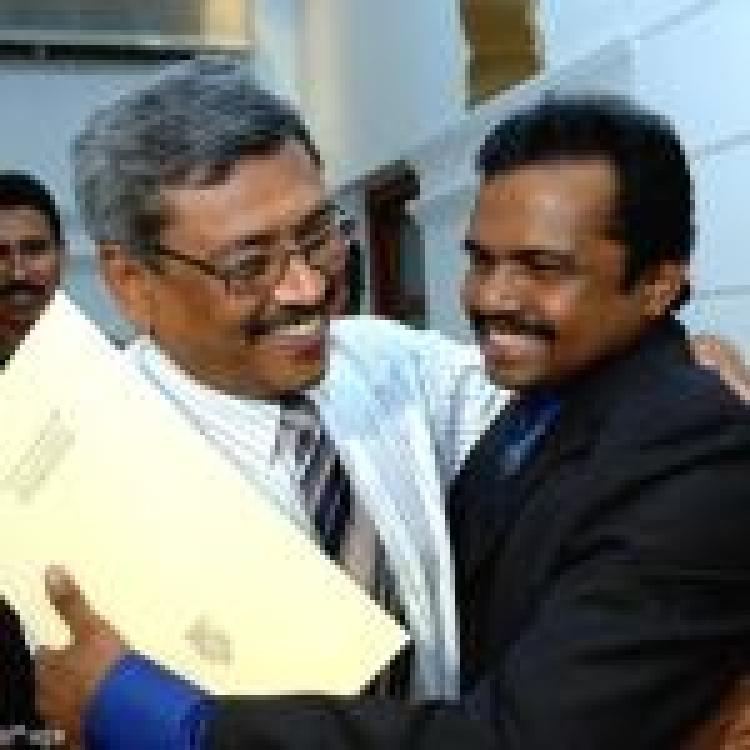
The Office of the United Nations High Commissioner for Human Rights (OHCHR) called for the Sri Lankan government-backed paramilitary leader Karuna to be investigated for crimes under international law, announcing that “accountability should apply to everyone in Sri Lanka".
"We note that Karuna former LTTE commander and Government minister, is being questioned for alleged past crimes,” said the office in a tweet yesterday. “He should also be investigated for wholesale recruitment of child soldiers, a crime under international law. Accountability should apply to everyone in Sri Lanka."
In a press release today, Human Rights Watch (HRW) also called on Sri Lankan authorities to "investigate and appropraitely prosecute Karuna for war crimes and other grave human rights abuses. "But with President Gotabaya Rajapaksa in office, himself implicated in war crimes, there remain concerns that Karuna will once again escape justice," Meenakshi Ganguly, South Asia Director at HRW commented.
"In 2007 he was arrested in the United Kingdom for travelling on a false document. He testified that his fake diplomatic passport was provided by the then-defence secretary, Gotabaya Rajapaksa, now Sri Lanka's president. Mahinda Rajapaksa, who is currently the prime minister but was then the president, appointed Karuna a government minister in 2009," she noted.
Read HRW's full piece here.
Karuna has recently come under fire after boasting a political rally in the East, claiming to have “2,000 to 3,000 Sri Lankan Army personnel in one night at Elephant Pass”.
"I have killed more in Kilinochchi,” he added. “That is certainly higher than the number of lives the coronavirus has claimed in Sri Lanka," he added.
Read more here: Karuna causes a stir with boast of victory at Elephant Pass.
After Karuna’s defection from the LTTE, he led a government aligned paramilitary group - the Tamil Makkal Viduthalai Pulikal - accused of kidnappings, extortion and executions. His organisation was often supplied weapons and training from the Sri Lankan state, as well as cover for the crimes they committed. Karuna’s support for the Sri Lankan military was key in assassinating Tamil political and military figures, as well as allowing the military to launch an offensive that killed tens of thousands of Tamil civilians.
In 2006, seven staff members of the Tamil Rehabilitation Organization (TRO) were abducted, the sole female gang-raped and all executed, reportedly by Karuna’s paramilitary organisation.
After defecting from the LTTE, Sri Lanka Army backed paramilitaries were also reportedly running amok in government controlled Muslim village of Pottuvil, terrorizing residents and extorting money.
A 2007 report from HRW spoke about the Karuna group’s use of child soldiers and the Sri Lankan military’s complicity in allow abduction of children to take place.
See extracts below.
Transporting several hundred abducted youth during the year to the Karuna camps would have been impossible without the complicity of government security forces: travel through the area necessitates passing through numerous checkpoints of the army and police.
But for residents of Sri Lanka's eastern districts, government complicity in Karuna abductions is an obvious fact.
Tamil and Muslim civilians in Ampara, Batticaloa, and Trincomalee districts say they have seen Karuna members working with the army and police at checkpoints to check IDs, and that armed Karuna cadre walk freely through villages and towns in areas under government control.
Among international aid workers in the eastern districts, the connection is also clear."Recruitment is happening openly and with impunity," one international aid worker said. "It's incomprehensible for us that the government would say they don't know what's going on." Staff members of two international agencies told Human Rights Watch that the easiest way for them to contact the Karuna group was through the Sri Lankan military.
Brad Adams, Asia director at HRW said at the time, “The government is fully aware of the abductions but allows them to happen because it’s eager for an ally against the Tamil Tigers.”

